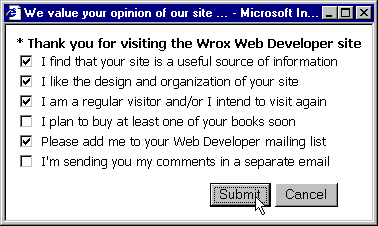
Would you be able to guess how many visitors your site gets, without looking at the log files? Most sites provide some kind of feedback opportunity to visitors, but what proportion actually tell you what they think of your site? Five percent, one percent, or less?
One way to look at this kind of question is to think about what you do when visiting other sites. How often do you take the time to fill in a simple 'What do you think of our site?' form? How often do you bother to find the Webmaster's email address and send them an email saying how much you enjoyed your visit? Chances are, not very often.
So our site could be handling thousands of visitors every day, yet without putting some effort into analyzing the log file data we have no idea about where they go, what they're looking for, and whether they found it. In Chapter 7, we looked at how we can provide an 'opinion' page asking for comments, but we can guess that a large number of visitors won't even bother to fill this in.

From data we've collected over the previous six months, we confirmed our general suspicions about the kinds of information that visitors to our Wrox Web-Developer site are looking for. However, we were surprised by some of the results as well. Certainly some of the assumptions we made in early days about what our site should offer have been proved wrong by the results of monitoring both its performance, and the behavior of people that visit the site.
For example, we suspected that the majority of visitors would use the site to run the examples in the books we produce, and to download the sample code to run on their own systems. Traffic patterns confirm this to be the case. We also assumed that people would be looking for hard reference information on a range of Web-related topics, and again we were proved right by the popularity of the HTML and IE4 Reference databases we provide.
However, other things were more surprising. For example, a sample chapter from a proposed (and cancelled) book about programming Microsoft Office Assistant has proved far more popular than we ever expected. Yet the levels of interest in Microsoft Certificate Server have been well below expectations.